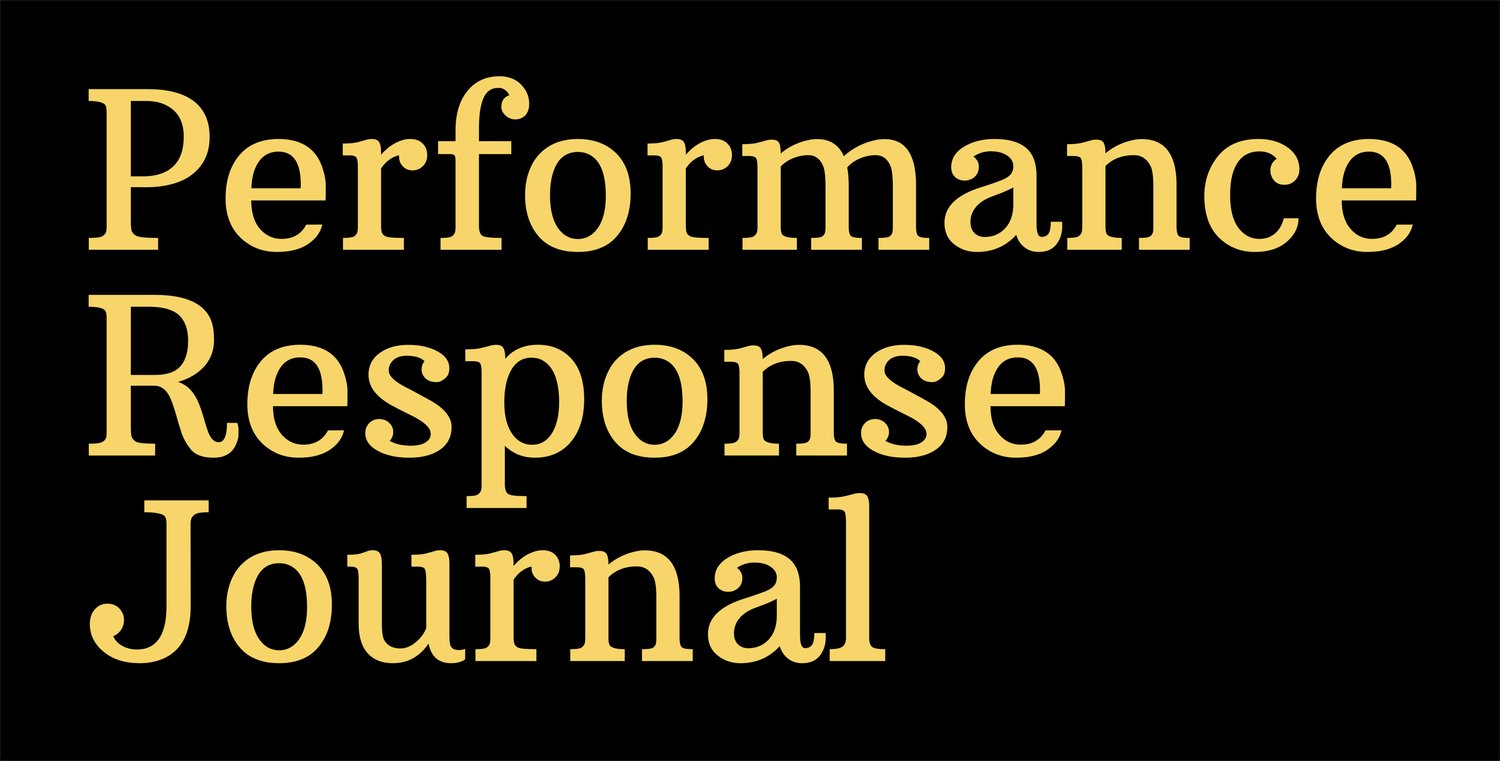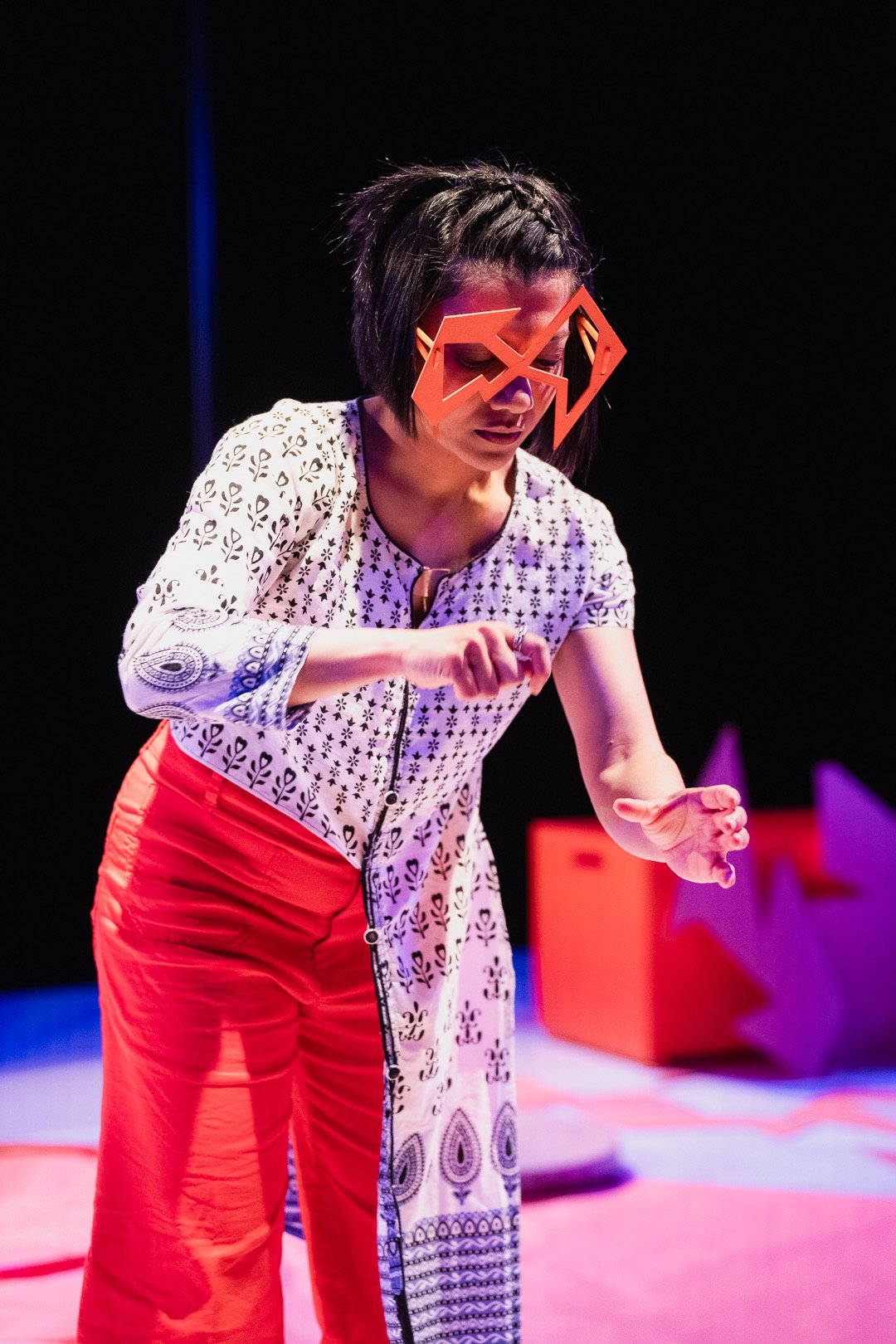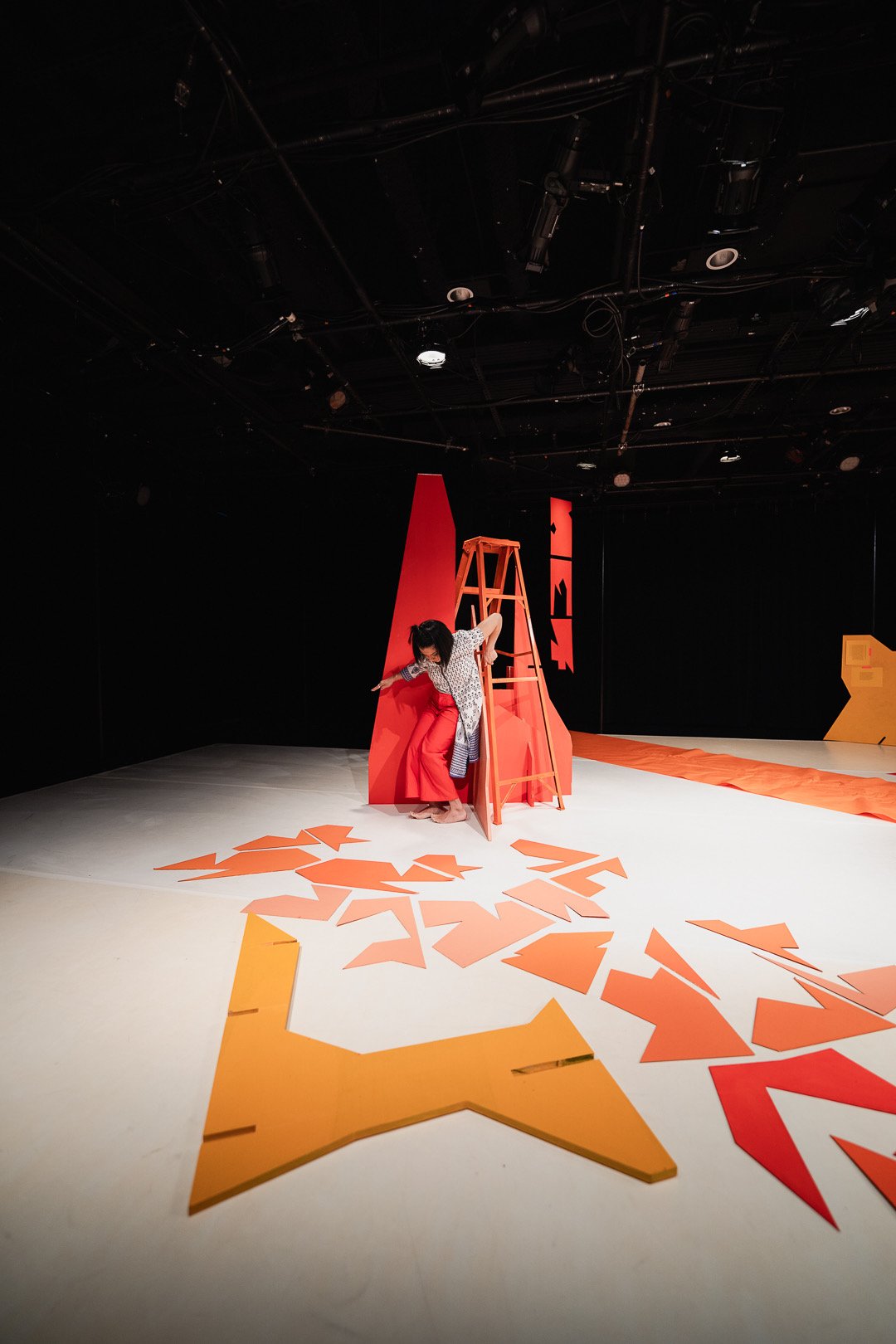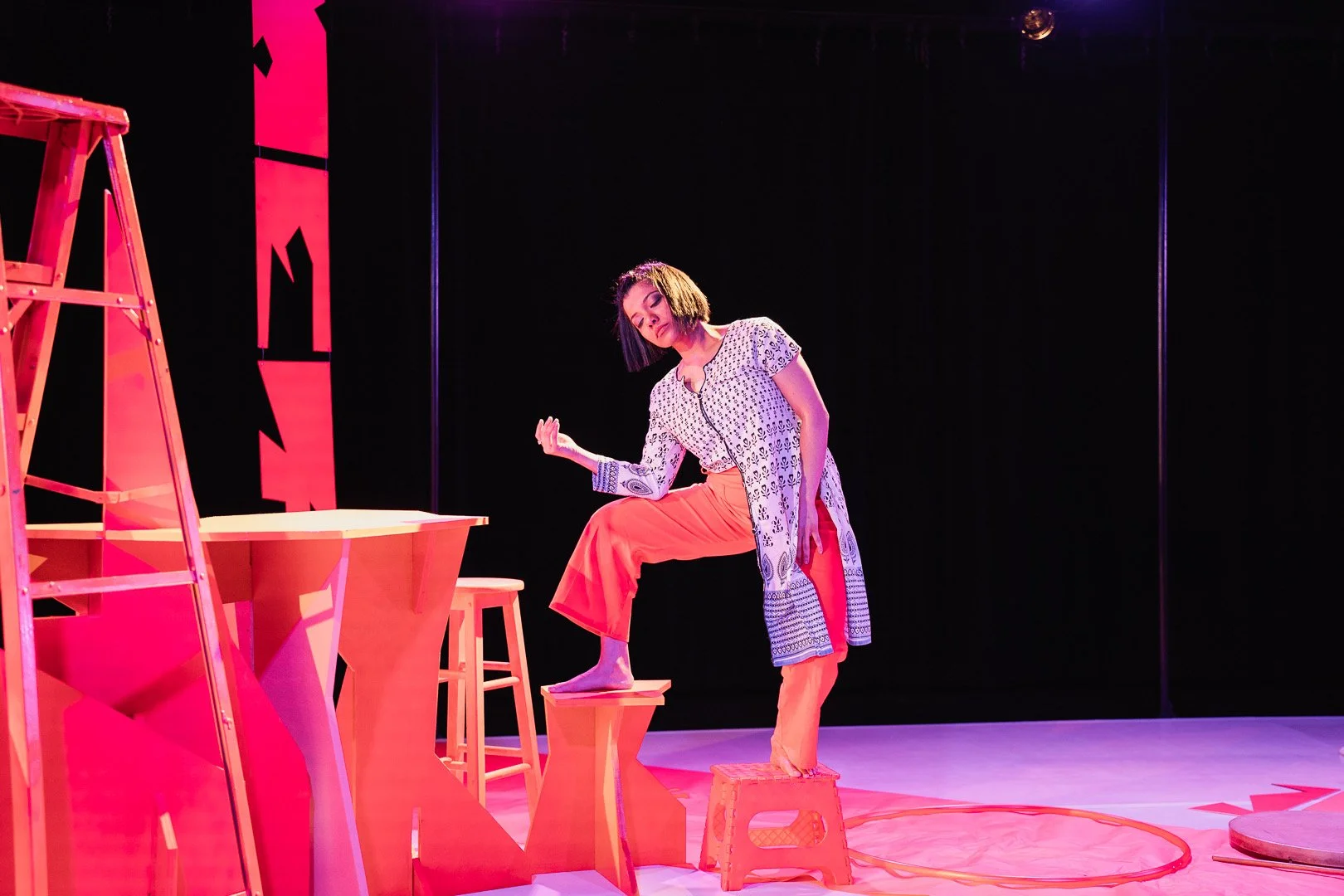Six artists respond to Anjal Chande’s The Next Cup of Tea
Image captured by Ricardo Adame
The Next Cup of Tea – which took place on March 8-9 & March 14-16, 2024, at Steppenwolf’s 1700 Theater, co-presented by the Museum of Contemporary Art and Steppenwolf’s LookOut Series – is a project that braids numerous themes and elements together into a zigzaggy, many-things-all-at-once performance by Anjal Chande and pianist Sharon Udoh. Resonant with those qualities, below is many voices all at once sharing their reflections on the show. Thank you to Ashwaty Chennat, Keyierra Collins, Shireen Hamza, Chrissy Martin, Bundo Onwueme & Anand Venkatkrishnan for contributing a thoughtful range of responses.
___
A RESPONSE BY ASHWATY CHENNAT
Beckoning the eclipse, city birds shake the trees, and the grass stands saturated and green. It’s been three weeks since I have had three servings of The Next Cup of Tea.
I met Anjal ten years ago. I wanted to engage with some version of an artistic practice I was engaged in – that is, bharatanatyam – but wanted to be in the presence of someone exploring new possibilities for it. Anjal Chande was that 10 years ago, and I can say that she still remains that person for me.
For me, The Next Cup of Tea was a personal, relevant and charged “conversation.” I wondered about others attending who may have had questions, old nerves twisted, or new blood pumped into their systems during their Cup of Tea. Whatever feelings were stirred, the show was an overdue return to life for a form – bharatanatyam – that people have believed to be and have kept fossilized. This is not an ancient form: it is living, it is historical, it is currently creating harm, but it also can be used as resistance. It was exciting to see Anjal’s conversation growing from a garden of resistance. Resistance not just in bharatanatyam, but in our entire being. Who are we, really, in relationship to our communities, to the “Big C’s,” to a racialized identity? This is something that I rarely see depicted or realized within the Indian diaspora, the Hindu upper-caste (savarna) diaspora, who have financial and social privilege. Anjal names this all. I appreciate the conversation.
Anjal is vulnerable and revealing. Watching her find little pieces and connections in her life is an auspicious process. When someone can piece together their own (cardboard, wood, paper, plastic set pieces) they’re doing magic in their own lives. And when they’re able to make their pieces greater pieces that extend beyond the stage, through ether, and into our lives, that’s beyond magic. I hope that in my lifelong viewing of expression – I don’t even want to call it art – that I am moved to know a person’s soul. Whatever they choose to share with me. Art is not for pockets, it’s not clink, tink, tarikita thom, tarikita thom. Thank you, Anjal.
During my third cup, I did a face check of the room: of Desi friends, non-friends/strangers. I watched to see which moments would come home. The reality is: when we are having a “cultural exchange” and someone is being honest, there are a lot of missed moments and missed nuances. I don’t know that the rest of the audience understood the risks that this work was taking – that Anjal was taking – when she was offering what she observed and what she knew, through her soul, was not working around her. Every time she raised something, I feel like I felt it, but I’m also not completely in Anjal’s shoes. I know that the Desi folks in the audience felt more than others, but maybe not ready to receive.
This is what we need. We need provocation. Maybe we need to admit how we, too, are uniquely provokable.
The Next Cup of Tea is a successful demonstration of the experience of human life as fragmented. By demonstrating the fluidity of thought, the fragments of this show are a reflection of a mind. The set pieces complement this. With each show I got to experience, Anjal discovered new ways to tinker with her plastic pieces, her orange construction paper river-roll, her teacup, adding more specificity and life to the material world she lovingly created around her. They all found new lives and more lives, as any “living theater” would.
There is convergence of Anjal’s incredible and multifaceted skills, from her finely executed bharatanatyam and her abstractions of it; to her admirable rhythmic sense and use of body tabla, ladder tabla, and how she finds percussive patterns within the mundane; to her ability to perform with power and connection to everyone around her; to her text and poetry. All of these things exist together and illuminate more. Aren’t we all multi-skilled? Aren’t we all multi-talented? Aren’t we all fragmented? Aren’t we all whole? This is inspiring to those of us who can say something. Speak up. But for now, we have listened.
___
A RESPONSE BY KEYIERRA COLLINS
3 things that interrupt…
A naked fire dancing on the surface of rage
The cracked bubbles, revealing themselves from the root of a boiling pot
The last Sun forcing day to unravel the night
3 things I know…
The nerve of a supremacist hunter in pursuit of me
An exhausted body submitting to dance opposing violence over and over again
Attempts to prove out the tainted fragments of my poked spirit
6 things left behind…
The looping silence next to your bed, not far from the last pair of shoes you wore
The skip-skip-skipping already erasing the old song my heart used to play
The soreness residing in the lowest of my feet
Exasperation, because I’m left to clear the lingering debris
The turmeric cloud in my breath after the last sip
A finished cup
And I heard you say, “Hi...thank you for being here.”
As if we would be here awhile
As if to give permission to make comfort with our seats
But I only saw “here” for a moment
Left back and forth as soon as I walked in
I had been left
Was been pulled out to THEN fizzle through orange shards like broken glass that lay
Like lilypads of many, as they spread leaving slithers of open water behind
An invitation to come see the wet floor their leaves used to cover
I fell in
Above my head, I heard the pulse of feet as they decorated rhythms, slightly shifting the shards
Saw the soles before hearing the thud
Tracked the notes of each foot ahead the sound drumming the water next to my ear
Saw the paths before their visibility was made
And the cup...in front of me, tipping towards me
The words of past memories clinked, clanked, tinged dancing as they fell and rose
in the belly of the cup
Watched as they poured from the lip
A meager cup...big enough for just some of the past
Just one more dance
But still plenty room to hold all the anger for 3 of me
I came up once more, got air as the blood orange tints retreated
Made room for emerald hues to bathed us just as the drum beats became old
In this reality, a proper mind fathoms talking yesterdays, gives way to new life
Conversing about passed loved ones conjures them to live on
Leaving their spirits to permeate however they such please
That's permission to LIVE
Refusing only survival
To belief up new life with one hand up to God and the other holding all my pieces
To fall, leave, and come back again and again
I heard you say “Thank you for being here, thank you for coming to my show.”
Made a choice to move forward
I allowed me to get left behind
In the shards
Parts of me scattered the room
Like them shards...laying displayed on floor
Like the dust floating off the saffron lanterns
Left behind
Like the remaining heat settled in my chest after the last sip
A RESPONSE BY SHIREEN HAMZA
Watching Anjal Chande move across the stage of the Steppenwolf Theatre, I found myself focusing on her bare feet. As she danced standing on the rungs of an overturned stool, as she swung back and forth across the back of a ladder, as she pounded out rhythms on the floor, I wondered if her feet were aching. I wondered if her parents and her grandfather had ever called on her to massage their feet, to relieve the ache of exhaustion. I wished I had massaged my grandparents’ feet more often.
Art in South Asia and its diasporas always involves family, whether or not it explicitly acknowledges them. In The Next Cup of Tea, the passion and precision of Anjal’s dancing becomes inextricable with her family’s labor histories. She tells us of her parents’ immigration to Chicago, that they made $2/hour at their first jobs. She explains that, as an educated couple with caste privilege, they were able to move into the middle class. And looking back over the years, she shares her surprise at how much of their savings they spent on her dance classes. She allowed me to revisit my own ambivalence at being excluded from classical Indian musical training as a child because of the oppressive hierarchies within the South Asian diaspora; perhaps it is better that I study as an adult. She tells us of her late grandfather’s decades of clerical work for India’s railways, and how, upon moving to America, he gave up his soft cotton dhotis for pants. Because of Anjal’s generosity with her family’s stories, each of her footfalls in this show resounds with generations of work and migration.
Anjal reveals to us that she does not come from a family of musicians and dancers. Her show is not a demonstration of her skill as the descendant or prodigy of a great master – more familiar narratives in the world of Indian classical dance. It is instead about a family coming together to help her become an artist. She traces her genealogy to the movement of her grandfather’s hand, his “expressive tapping” and gliding on his thigh as he listened to music “with his entire being.” She wonders if his hand could have been a drummer’s hand. My tears begin to flow, as I mourn the loss of my elders, their hands moving subtly to music, their voices crooning Gujarati Muslim songs of praise and advice to ease me into sleep. I feel them near me, as Anjal sits in a wooden yellow chair and lets her hand move slowly to Sharon Udoh’s profound rendition of Nina Simone:
“I wish I could share all the love that's in my heart
Remove all the bars that keep us apart
I wish you could know what it means to be me
Then you'd see and agree
That every man should be free”
Anjal’s willingness to share details of her life in such specificity is an act of love that connected us to her and to each other in that theater. She led us in a prayer for a world in which all of us – from the prisons of Illinois to the hospitals of Gaza – from one heart to another – are free. With the softness of Anjal’s hand tracing a tear down her face, may we tend to each other’s weariness. With the force she used to strike out each beat, may we plant our feet in the grounds of struggle for collective liberation.
___
A RESPONSE BY CHRISSY MARTIN
Building to Erupt, Erupting to Build
It starts with an offering: hot and spicy ginger tea in a carafe right as I walk into the Steppenwolf black box theater for Anjal Chande’s The Next Cup of Tea, part of Steppenwolf’s Spring 2024 Lookout Series.
It starts seven years ago when I meet Anjal as a part of the Synapse Arts’ Co-MISSION Festival of New Works performance. Anjal is bright-eyed, full of joy and has a quiet, grounded grief about her. She dances for and with her grandfather who has recently passed. There is a recording of her voice telling us the story of a gentle man with gentle words while measuring rhythmic movement, some of which derives from her rich bharatanatyam practice, across the stage. I remember the vivid imagery of her as a little girl, glued to her favorite family member. I remember the peace, calm, and grounded presence of her thoughtful longing.
It starts when Anjal looks at the audience with fire in her eyes and a warm spirit. She is wearing a white kurta and red pants by costumer Maggie Bridger. The lightweight kurta has a delicate blue pattern split in half: half of it is short-sleeved and shorter in length, with the other half at quarter-length sleeved that comes down slightly past her hips. She says hellos and nods in acknowledgement to every face she can see, squinting to touch the back row with her eyes. There is a welcome here, but also a challenge: “can you stay with me?” I wholeheartedly accept.
It starts when Anjal climbs a ladder center stage, amidst a sparse, bright orange mountain, with her now at its peak, and she says, “Hi, I’m angry. Welcome to my show.” She says this with her full being. I can see the command, demand, the pain in her eyes, and can hear it in her voice. I am in awe of her, and a bit scared. She wields her power sharply and without apology.
Anjal’s tone is different than it was during her foray into this material seven years earlier. She is defiant, contemplative, spiraling, questioning everything that she knows, grounded again in memories of childhood, of her gentle and hard-working grandfather, in her tumultuous emotions, which cascade into the audience like billows of smoke from the fire of revelation.
As Anjal fills the space with sense memories, anti-capitalist anecdotes, moral quandaries, enraged outbursts, historical contexts, and deep existential questions, so does she fill the stage with these ingenious interlocking pieces designed by David Ofori-Amoah. On their own, each piece looks like an unassuming child’s toy, but as the show continues, the pieces transform into a small tea table, a countertop, a chair, and the aforementioned mountain (or is it a volcano?)
Anjal perches atop these set pieces often in reverie. She mimes making tea – as a refrain for everyone, including her, to calm and find ground in ritual – while telling us that dance is unraveling for her. Every facet of her identity that she associates with dance, with a cultural form that she grew up learning thanks to the blood and sweat of her parents’ labor, and now teaches to youth in her own dance studio, Soham Dance Space, built on a dream of being a “real'' successful artist, is riddled with assimilation, the imperialist agenda, commodification and exportation of Indian culture to make it palpable to white people.
Sharon Udoh provides a sweeping and heart-wrenching sound score to this magnum opus, at once shifting the mood from playful to solemn, from contemplation to grieving. She plays echoes of ragas that sit in Anjal’s mind, ones that her grandfather used to listen to every morning, creating a soft container for all the beauty and chaos of Anjal’s truth.
For Anjal, her grandfather’s spirit represents everything that capitalism cannot commodify. The tea that he taught her to savor slowly, the moments where time was not industrial, the moments of true listening, the moments where she catches glimpses of the truth, the moments where truth literally slaps her in the face, are the reasons that Anjal performs. I see her building herself a structure of ecstatic rage and grief to lift her up into the world with a full heart, inviting us all along on the journey with her. I am transformed by this performance. I feel different afterwards, and am still feeling the echoes of it three weeks later.
Image captured by Ricardo Adame
A RESPONSE BY BUNDO ONWUEME
Stage right, back row, sat on a black foldable chair. Nestled with my paper cup of herbaceous ginger tea.
Alone at last. Let the show begin.
There are 3 things that drip.
Lava: This felt like a confessional, but not as a negative or shameful burden, where one's sins and faults are weighted against the litmus of purity and innocence. I felt divided, as if I were eavesdropping on an intimate moment, a veil between personal words and their actions. I became the byproduct of that experience, feeling made anew. Where words limit the interpretation of this artwork, silence holds infinite possibilities.
Tea: This was a performance that at times made me contemplate my own tangled relationship with my immigrant community: parents, grandparents and in-laws alike. An unwavering motif that carried the love of family, particularly Nana, Anjal’s grandfather, through the eyes of an adolescent child, whose growth was like that of a seed in a greenhouse; protected from the harsh elements life, tempered with warmth and light of heritage, illuminated by language that shines and speaks through, infused with rich organic Brown cultural elements, yet trapped by the same effects of its making. I am uncertain if Nana was watching. I am certain if he were, he would say, “my flower has bloomed.”
Liquid salt bursts through my eyes.
Sad and joyful Tears embrace my cries.
If the music stops, the dance must too.
The music stopped...what am I to do?
There are 3 things that rock.
Performer, musician, and... If you haven't guessed it by now, maybe it's best you buy a ticket, and go see it for yourself. It's still rocking!
Stage right, back row, sat on a black foldable chair. Nestled with my empty paper cup of herbaceous ginger tea. I was never alone. I must confess, this is what I needed.
___
A RESPONSE BY ANAND VENKATKRISHNAN
Lakshmi
They said you bubbled up
from an ocean of milk
where gods and demons once played at housework
tugging their ropes and churning their rods
like uncles in the living room boasting of
legendary kitchen conquests.
They said you missed your friends
from back home so much,
wishing trees and white horses,
wine, gems, the crescent moon,
that you kept tokens to entertain yourself on lonely nights
when he’s off somewhere taking names
and you get called them:
greedy, skittish, addictive, harsh, crooked.
Who could blame you for running away,
caged in by a thousand glittering swords,
while the soldiers of family and fame —
lordly husband
smug in-laws
handsy relatives
menacing fans —
take you for granted I mean for
granting.
I swear I’m not like them
so would you run away
with me?
Image captured by Ricardo Adame
*******************************
About the Writers (in order of appearance)
Ashwaty Chennat is a performer, facilitator and gatherer. Her processes include long conversations, considerations of cultural structures and their thresholds, and play.
Keyierra Collins is an Afro-Interdisciplinary choreographer and performer. She shapes imaginative, abstract, and personal writings to performances, including for her solo project, "How I Found My Feet Again."
Shireen Hamza is a disabled scholar and artist in Chicago who dances, teaches with PNAP at Stateville Prison, and holds a postdoctoral fellowship at Northwestern. shireenhamza.com
Chrissy Martin is a transdisciplinary performance artist and educator, who blends contemporary dance and language/voice to rigorously examine her intersecting queer and neurodivergent identities. chrissymartinmakes.com
Bundo Onwueme is a self-proclaimed renaissance man, who loves art and its many mediums. He is the author of children’s books that introduce vocabulary words in his native Igbo language.
Anand Venkatkrishnan is Assistant Professor at the University of Chicago Divinity School. He hasn’t written poetry in years.
About the Show
https://www.anjalchande.com/the-next-cup-of-tea






